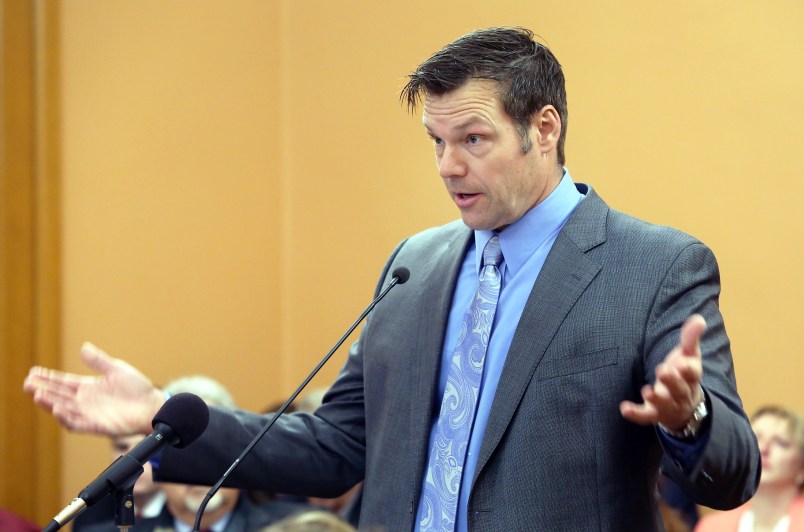A federal judge late Tuesday ordered Kansas to restore the voting rights of some 18,000 residents who had been kicked off the voting rolls because they did not provide proof of citizenship when registering to vote at the DMV.
Judge Julie A. Robinson, of the U.S. District Court for the District of Kansas, issued a preliminary injunction on part of the state’s proof-of-citizenship voting law in response to a lawsuit challenging the law filed by the ACLU on behalf the League of Women Voters of Kansas and individual voters. It is one of a number of legal challenges percolating around the Kansas requirement that has been championed by Secretary of State Kris Kobach.
The opinion gives the state until June 1 to restore the disenfranchised voters to the voting rolls.
The challengers alleged that the proof-of-citizenship requirement is a violation of the 1993 National Voter Registration Act, also known as the federal “motor-voter” law. Robinson, in her preliminary injunction Tuesday, signaled she believed it was likely challengers would win in a full decision on the merits.
Under the law, those who tried to register to vote at the DMV but didn’t have the required citizenship documentation were automatically put on a “suspense” list. They would then be informed via mailed notices or a phone call that they were not successfully registered and would have 90 days to provide the documentation.
“First, Plaintiffs have made a strong showing that the process of submitting [documentary proof of citizenship] for motor voter applicants is burdensome, confusing, and inconsistently enforced,“ Judge Robinson said, noting that the state had offered no evidence that registrants were informed while at the DMV that their voting registrations were incomplete.
“Second, Plaintiffs have made a strong showing that there is at least one less burdensome alternative to assessing United States citizenship—an attestation along with an applicant’s signature under penalty of perjury,” Robinson said, referring to the system that Kansas had before the law and that most other states use.
The opinion was also highly suspicious that voting fraud was so prevalent to warrant the law, or that the requirement would prevent the rare incidents of voting fraud that have been prosecuted in the state.
“This evidence supports the conclusion that very few noncitizens in Kansas successfully registered to vote under an attestation regime,” Robinson wrote. “Importantly, there is no evidence that under that regime, thousands of otherwise eligible applicants were cancelled or held in suspense for failure to establish eligibility requirements.”
Read the opinion below:







Kobach should be sent to Gitmo.
Outstanding! Now can we throw Kobach in prison for tens of thousands of violations of Americans’ civil rights?
This is good news!
Has anyone checked whether Kris Kobach is actually a citizen? Eligible to vote?
Kinda wondering, given his zealous attempt to limit the vote…
Kobach is a sorry excuse for a human being
The jig is up, Kobach. Your anti-democracy, vote suppressing buddies in WI spilled the beans.